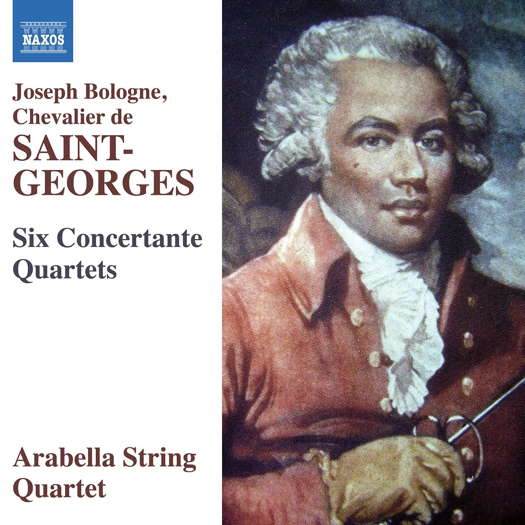 SPONSORED: Ensemble. A view from the pit - John Joubert's Jane Eyre, praised by Alice McVeigh.
SPONSORED: Ensemble. A view from the pit - John Joubert's Jane Eyre, praised by Alice McVeigh.
All sponsored features >>

Saint-Georges: Six Concertante Quartets
8.574360 (Naxos Records, CD)
DDD
FIRST RELEASE (27 May 2022)
Playing time: 52'43"
Tracks: 12
Booklet pages: 6
℗ 2022 Naxos Rights (Europe) Ltd
© 2022 Naxos Rights (Europe) Ltd
Main country of recording: United States of America
Country of manufacture: Germany
Reviewer: Gerald Fenech
Review of Saint-Georges: Six Concertante Quartets published on 2 June 2022
Arabella String Quartet:
Julie Eskar, violin 1 (tracks 1-6), violin 2 (tracks 7-12)
Sarita Kwok, violin 1 (tracks 7-12), violin 2 (tracks 1-6)
Ettore Causa, viola
Alexandre Lecarme, cello
Joseph Bologne, Chevalier de Saint-Georges (1745-1799):
Six Concertante Quartets (1777)
No 1 in B flat
1 Allegro assai
2 Gratioso
No 2 in G minor
3 Adagio
4 Aria andantino
No 3 in C
5 Allegro
6 Rondeau: Moderato
No 4 in F
7 Allegro
8 Rondeau
No 5 in G
9 Allegro assai
10 Gratioso
No 6 in B flat
11 Allegro
12 Aria con variazione
Recorded 14-15 June 2021 at Fraser Performance Studio, WGBH, Boston, Massachusetts, USA
A brilliant swordsman, athlete, violin virtuoso and composer, Joseph Bologne, Chevalier de Saint-Georges might well lay claim to being the most talented figure in an age of remarkable individuals. The string quartet was still in its infancy in France in the 1770s, but while these pieces are small in scale they are exceptionally rewarding. Saint-Georges appreciated the intimate nature of this genre, avoiding overt soloistic virtuosity and exploring chamber music timbres, amply demonstrating his rich lyrical gifts and a natural ability to delight performers and audiences alike.



